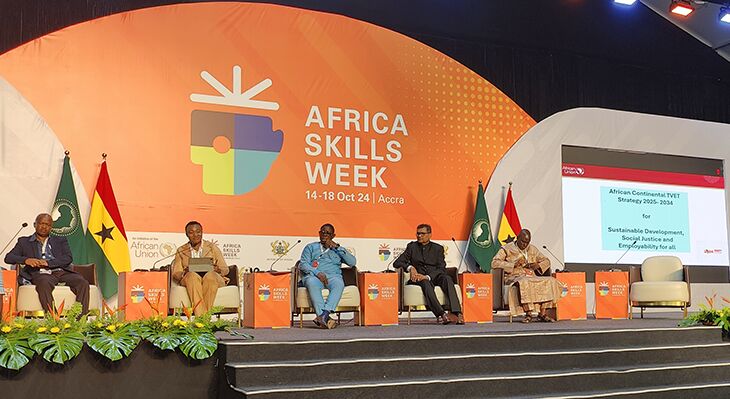Thinking TVET globally
07.11.2024
The first Africa Skills Week brought together decision-makers from Africa and at multilateral level in Ghana to address common challenges in vocational education and training. The foundations were also successfully laid for a joint, continental vocational education and training strategy.

Africa Skills Week 2024 took place from 14 to 18 October in Accra, Ghana, under the motto "Skills and Jobs for the 21st Century: Quality Skill Development for Sustainable Employability in Africa".
The high-profile event was organised by the African Union and the Ghanaian Ministry of Education, in cooperation with UNESCO-UNEVOC, the German Federal Ministry of Education and Research (BMBF) and other international organisations. Key topics were the promotion of technical and vocational education and training (TVET) and the adaptation of training content to the dynamic requirements of the African labour market.

The regional meeting of the BILT project also took place during the week. The focus was on regional exchange in vocational education and training, as well as the possibility of formulating a global vocational education and training strategy. In the panel discussions, it became clear that national and bilateral strategies have laid a foundation for the future, but that joint approaches are now required in vocational education and training in order to meet the diverse challenges.
One of the main objectives of Africa Skills Week was to address the existing gap between the skills that young people acquire during their education and the requirements of the labour market. In this context, numerous discussions were held between representatives from education, politics and industry in order to initiate concrete political reforms. These are intended to promote not only the expansion of vocational training, but also closer cooperation between educational institutions and companies.
The event provided an important platform for discussing political reforms. A recurring theme was the call for African governments to invest more in vocational training. This investment is crucial to tackling the challenges of youth unemployment and economic transformation on the continent. The participants emphasised that many African countries have traditionally invested more in academic education. This is often to the detriment of vocational training, which is, however, seen as crucial for economic development and the development of a competitive labour market.
In a panel discussion with representatives from the private sector and the International Labour Organization (ILO), Birgit Thomann, Head of the International Department at BIBB, emphasised the importance of the involvement of companies and social partners in vocational education and training. Only by playing an active role in the vocational education and training system could training become a priority for companies.
Africa Skills Week 2024 ended with concrete proposals and commitments to implement the measures discussed as part of a continental vocational education and training strategy. The participating stakeholders, including international organisations such as UNESCO-UNEVOC and ILO, reaffirmed their support for the sustainable development of vocational education and training and its role in Africa's economic future. Peter Thiele from the BMBF also emphasised that cooperation in the sense of a joint vocational education and training agenda with global reach should be supported even more strongly by the BMBF in future.